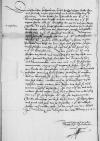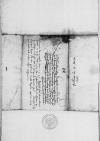 GStA PK, HBA, C1 No 654, 1r
GStA PK, HBA, C1 No 654, 1r
Durchlauchter, hochgeborner furst, hochgunstiger, lieber herr und freundt. / Unsere freuntliche und vleis willige dinste zuvoran. /
Wir haben im osterabendt[1] von E(wer) F(urstlichen) D(urchlauch)t / kamerjungen / drey cf. Albrecht I von Hohenzollern-Ansbach to Ioannes DANTISCUS Königsberg, 1540-03-24, CIDTC IDL 4987;
Albrecht I von Hohenzollern-Ansbach to Ioannes DANTISCUS Königsberg, 1540-03-24, CIDTC IDL 6327;
Albrecht I von Hohenzollern-Ansbach to Ioannes DANTISCUS Königsberg, 1540-03-25, CIDTC IDL 4988⌊brieffecf. Albrecht I von Hohenzollern-Ansbach to Ioannes DANTISCUS Königsberg, 1540-03-24, CIDTC IDL 4987;
Albrecht I von Hohenzollern-Ansbach to Ioannes DANTISCUS Königsberg, 1540-03-24, CIDTC IDL 6327;
Albrecht I von Hohenzollern-Ansbach to Ioannes DANTISCUS Königsberg, 1540-03-25, CIDTC IDL 4988⌋, / und den cf. Albrecht I von Hohenzollern-Ansbach to Ioannes DANTISCUS Königsberg, 1540-03-24, CIDTC IDL 4986⌊vierdencf. Albrecht I von Hohenzollern-Ansbach to Ioannes DANTISCUS Königsberg, 1540-03-24, CIDTC IDL 4986⌋ von E(wer) F(urstlichen) D(urchlauch)t eigner handt, / alle zu Königsberg (Królewiec, Mons Regius, Regiomontium), city in Ducal Prussia, on the mouth of the Pregel (Pregoła) river, capital city of Ducal Prussia; today Kaliningrad in Russia⌊KonigsbergKönigsberg (Królewiec, Mons Regius, Regiomontium), city in Ducal Prussia, on the mouth of the Pregel (Pregoła) river, capital city of Ducal Prussia; today Kaliningrad in Russia⌋ den XXIIII und XXV Marcii gegeben, erhalten on the margin⌈erhaltenerhalten on the margin⌉, / die unser forige schreiben mit sonderer freuntlicheit beantwort, / auch, was von zeyttungen gewest, mit geteilt, / do vor wir E(wer) F(urstlichen) D(urchlauch)t hochlich dancken. / Was ins erst Ioannes Golinski ⌊GolinskiIoannes Golinski ⌋ angehet, hat uns E(wer) F(urstliche) D(urchlauch)t widderschreiben an Sigismund I Jagiellon (Zygmunt I) (*1467 – †1548), King of Poland and Grand Duke of Lithuania (1506-1548); Duke of Głogów (Glogau) (1499-1506), Duke of Opava (1501-1506), Governor of Silesia (1504-1506); son of King Kazimierz IV Jagiellon and Elisabeth of Austria⌊ko(niglich)e m(aieste)tSigismund I Jagiellon (Zygmunt I) (*1467 – †1548), King of Poland and Grand Duke of Lithuania (1506-1548); Duke of Głogów (Glogau) (1499-1506), Duke of Opava (1501-1506), Governor of Silesia (1504-1506); son of King Kazimierz IV Jagiellon and Elisabeth of Austria⌋, unsern allen gnedigisten herren, / und die Royal Council of Poland ⌊prelaten und rethe der CronRoyal Council of Poland ⌋ fast wol gefallen. / Solchem unchristlichen menschen ist noch vil zu vil genad von E(wer) F(urstlichen) D(urchlauch)t bewiesen / etc.
Wie auch E(wer) F(urstliche) D(urchlauch)t aus hochem vorstandt und vorsichtigheit vor das beste ansehen, / dieweil die sache zwuschen den burgundischen und Denmark (Dania)⌊DennemarckenDenmark (Dania)⌋, / wie wir aus E(wer) F(urstlichen) D(urchlauch)t schreiben vornommen, / etwas nach ungewiss stehen, das hir ym Royal Prussia (Prussia Regalis), region, part of Prussia annexed to the Kingdom of Poland in 1466 under the provisions of the Second Peace of Thorn⌊landeRoyal Prussia (Prussia Regalis), region, part of Prussia annexed to the Kingdom of Poland in 1466 under the provisions of the Second Peace of Thorn⌋ dis koniglichen orts / gut aufmerckung wurde gehalten / tewrung zuvorhutten, / provision zu machen / und in bereitschafft zu sein, / muge wir nicht anders, dan fast loben. / Wollen auch in zu kunfftiger unser Provincial Diet of Royal Prussia ⌊tagefartProvincial Diet of Royal Prussia ⌋ neben andern Council of Royal Prussia the most important local authority in Royal Prussia. It consisted of two bishops (of Ermland (Warmia), who served as the Council’s president, and of Kulm (Chełmno)), three voivodes (of Kulm, Marienburg (Malbork), and Pomerania), three castellans (of Kulm, Elbing (Elbląg), and Gdańsk (Danzig)), three chamberlains (of Kulm, Marienburg, and Pomerania), and representatives of the three Great Prussian Cities – Gdańsk, Thorn (Toruń), and Elbing (ACHREMCZYK 2016, p. 17-18)⌊hern rethenCouncil of Royal Prussia the most important local authority in Royal Prussia. It consisted of two bishops (of Ermland (Warmia), who served as the Council’s president, and of Kulm (Chełmno)), three voivodes (of Kulm, Marienburg (Malbork), and Pomerania), three castellans (of Kulm, Elbing (Elbląg), and Gdańsk (Danzig)), three chamberlains (of Kulm, Marienburg, and Pomerania), and representatives of the three Great Prussian Cities – Gdańsk, Thorn (Toruń), and Elbing (ACHREMCZYK 2016, p. 17-18)⌋ uns dorzu, so vill ummer muglich, befleissen. / Ist uns auch der und viln anderer hendel wegen lieb, / und achtens vor notturftig, das E(wer) F(urstliche) D(urchlauch)t zubesuchen Sigismund I Jagiellon (Zygmunt I) (*1467 – †1548), King of Poland and Grand Duke of Lithuania (1506-1548); Duke of Głogów (Glogau) (1499-1506), Duke of Opava (1501-1506), Governor of Silesia (1504-1506); son of King Kazimierz IV Jagiellon and Elisabeth of Austria⌊ko(niglich)e m(aieste)tSigismund I Jagiellon (Zygmunt I) (*1467 – †1548), King of Poland and Grand Duke of Lithuania (1506-1548); Duke of Głogów (Glogau) (1499-1506), Duke of Opava (1501-1506), Governor of Silesia (1504-1506); son of King Kazimierz IV Jagiellon and Elisabeth of Austria⌋ hat vorgenommen. / Got der almechtige vorleihe dorzu seinen heiligen segen und gnad, / und gebe, das es derselbten E(wer) F(urstlichen) D(urchlauch)t allenthalben noch willen gehe, / in der gunst wir uns bevelhen. /


 GStA PK, HBA, C1 No 654, 1v
GStA PK, HBA, C1 No 654, 1v